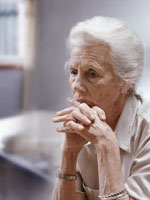
Depression is not a
normal part of aging, but nearly 20% of the older population—twice the rate of
younger cohorts—experiences it. Even more troubling, only half of seniors with
mental health problems gets treatment of any kind, and less than 3% get treated
by a mental health specialist.
By the time people
are over 65, illness and personal loss have likely started to intrude in their
lives. Sadness and grief are normal reactions to these situations, but sadness
and grief do not equal depression.
"Older adults
are fairly resilient considering the stress many of them are under," says
Joel E. Streim, MD, a geriatric psychiatry specialist at the University of Pennsylvania.
"Many older adults are losing companions and spouses, coping with physical
disability and dependence, or moving to senior housing. And we know that
relocation is one of the most stressful events in anyone's life. So when
depression does occur, it is an illness that must be treated." Depression
is persistent and interferes with a person's ability to function in daily life.
It robs people of their peace of mind and their enjoyment of simple pleasures;
makes them feel worthless, unlovable, and irritable; and can contribute to
early death.
Depression hits the elderly
hardest
Suicide is the most feared
complication, and it hits older adults harder than any other age group. In
2004, people aged 65 years and older accounted for 16% of all suicide deaths in
the United States even though they comprised only 12% of the population. That
same year, 14.3 in 100,000 people age 65 and older died of suicide. The rate in
the general population was 11 per 100,000. The older people get, the worse it
gets. For every 100,000 white men age 85 years and older, 49.8 committed
suicide. Depression is to blame for many of those deaths.
Why depression gets missed
"Depression gets missed in
geriatric populations for several reasons," says Kenneth Robbins, MD, a
psychiatrist who runs a geriatric inpatient unit in Stoughton, Wis. "The
assumption is that because people are older and they've had a lot of losses,
'How could they not feel depressed?' And so, they don't treat a major depression
that would be easily treatable."
While it's true that depression
is not a normal reaction to aging, the risk of depression increases as people
age and become more debilitated. The rate of depression in older people living
in their own homes, who get around pretty well and are in decent health, is in
the range of 1% to 5%. The rate goes up to about 13% in people who need home
health care.
Aging can worsen existing
depression
There's another side of
depression in the elderly. Sometimes it's a continuation of a problem that
existed when a person was younger. Aging doesn't cure depression, and time
definitely doesn't heal all wounds.
"I've been in and out of
therapy throughout my adult life, and I'm still in therapy," says Evelyn,
90, who lives outside Boston. Evelyn has struggled with eating problems since
her kids were born, and several therapists have confirmed that her difficult relationship
with food is a manifestation of her depression.
Lots of medical problems get more
complicated as you age, and depression is no exception. It can be harder for
doctors to diagnose, and treatment is sometimes trickier. But effective
treatment is available. You need to find a doctor who will be diligent in
getting to the source of your symptoms and persistent in finding the best
possible treatment for you.
health.com
Please share
No comments:
Post a Comment